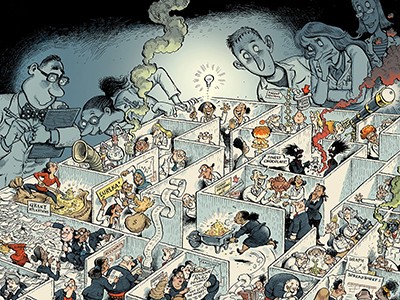For academics, working with industry’s vast sources of proprietary data and innovative tools can be enticing. But tensions, including competing interests, might make these collaborations daunting.
Over the past few decades, I have seen how challenging such partnerships can be. But I’ve also seen how following best practices can make them work. In 2014, I co-authored Organized Innovation, analysing the US Engineering Research Centers programme — supporting hubs hosted in universities and funded by the US National Science Foundation that engage productively with corporations. We learnt that successful collaborations not only acknowledge that conflicts can arise, but also commit to creating formal procedures for resolving them.
Japan can be a science heavyweight once more — if it rethinks funding
The stakes are high today. The ‘magnificent seven’ technology firms — Alphabet, Amazon, Apple, Meta, Microsoft, Nvidia and Tesla — and newcomers such as OpenAI have research and development (R&D) budgets that dwarf spending available to most academic laboratories. In 2022, Amazon, Apple, Google, IBM and Microsoft spent tens of billions of dollars on R&D. In 2024, Meta alone spent nearly US$44 billion, or 27% of its annual revenues, on R&D.
Many tech investments have shifted from the development to the research side. Last year, Demis Hassabis, co-founder of the artificial intelligence (AI) start-up firm DeepMind, acquired by Google in 2014, received jointly with his colleague John Jumper half of the Nobel Prize in Chemistry for developing AlphaFold, an AI model that predicts protein structures.
Yet, many academics remain wary of working with ‘big tech’, whose approaches can be controversial. These firms’ technologies connect people globally, increase productivity, foster economic growth and advance AI. But those same tools can also host and spread misinformation as well as exacerbate social biases and inequities. Corporate affiliations with the defence sector can raise ethical questions. Meta, for example, allows its large language model Llama to be used for military purposes. One way for companies to minimize such problems is through internal review boards.

Want to speed up scientific progress? First understand how science policy works
For academics, engaging with big tech can also come with real or perceived conflicts of financial interest (when money unduly influences research), commitment (prioritizing commercial over academic activities) or loyalty (prioritizing the company’s interests over those of an academic institution). These risks can be mitigated by committees that adjudicate conflicts.
Concerns about monopolies and a market concentration of leading tech firms — which can limit innovation and consumer choice — can make collaboration off-putting to academics. Government regulators and courts are stepping in. For example, in April, a US district judge in Alexandria, Virginia, ruled in favour of the US Department of Justice’s suit alleging Google’s illegal monopolizing of the advertising market.

